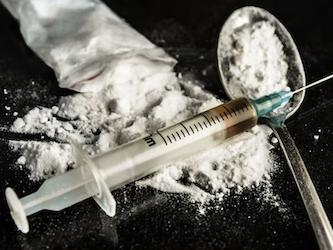
IN AN EMERGENCY IN THE U.S.A., DIAL 911
Drug Overdose. The ingestion or application of a drug or other substance in quantities much greater than are recommended. Typically it is used for cases when a risk to health will potentially result. An overdose may result in a toxic state or death.
Common Drugs: The opioid oxycodone, heroin, fentanyl, cocaine, methadone, morphine, hydrocodone; benzos alprazolam and diazepam; and the stimulant methamphetamine.
Per the CDC, the 5 most common drugs involved in overdose deaths are:

- Fentanyl: Fentanyl and fentanyl analogs such as carfentanil led to 19,413 deaths in 2016. Fentanyl is a synthetic opioid that is 50 to 100 times stronger than morphine. It is commonly substituted for or mixed with heroin without the user’s knowledge. Users who think they are taking heroin overdose because the drug is much stronger.2,3
- Prescription pain relievers: These drugs, which include medications such as OxyContin, Vicodin, and Percocet, led to 19,354 deaths in 2016. From 2002 to 2011 there was a 1.9-fold increase in the total number of deaths from these drugs. But the rate has remained relatively stable since then.2
- Heroin: Heroin overdoses led to 15,469 deaths in 2016. People who abuse prescription opioids often switch to heroin because it is cheaper and easier to obtain. One study found that nearly 80% of heroin users reported using prescription opioids prior to heroin.2,4
- Cocaine: Cocaine led to 10,375 deaths in 2016 (up from 6,784 in 2015). Many cocaine overdoses involve other drugs. For example, in 2016, 7,263 cocaine overdoses involved cocaine and an opioid. Fentanyl has been increasingly mixed with cocaine and contributed to the rise in cocaine-related overdoses.1,2
- Methamphetamine: There were 7,542 methamphetamine overdoses in 2016. Meth overdoses also tend to involve other drugs. In 2016, 3,416 meth overdoses involved any type of opioid and 1,042 involved a synthetic narcotic.2,5
In Addition
- Benzodiazepines: In 2016, there were 10,684 benzodiazepine drug overdose deaths. It is unusual for people to die from a benzodiazepine overdose alone, and a large portion of these overdoses included other drugs. For example, that year there were 9,233 benzodiazepine overdoses that involved any type of opioid and 3,308 that involved a synthetic narcotic. From 2002 to 2016 there was a 8-fold increase in the total number of deaths from benzodiazepines.2
- Antidepressants: Thousands of people overdose on antidepressants each year. In 2016, there were 4,812 overdose deaths from antidepressants. A total of 2,960 of these overdoses involved any type of opioid.2